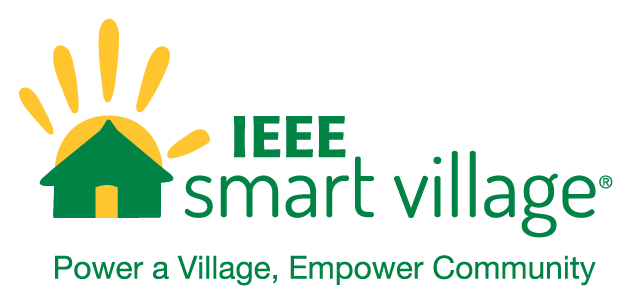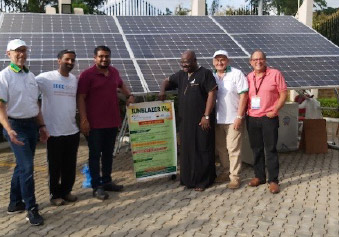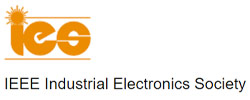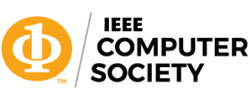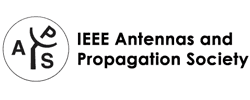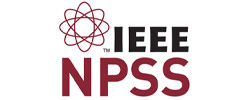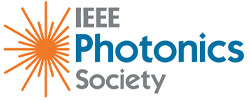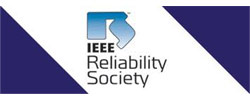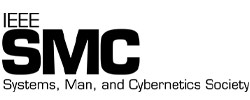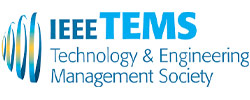EMPOWER: Vol 3. Issue 3 – June/July 2022
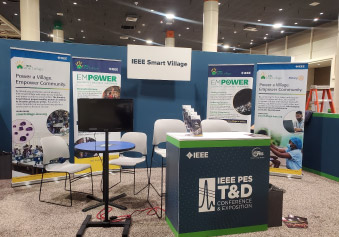
Smart Village’s Major Display at PES T&D
New Orleans hosted the 2022 IEEE/ Power and Energy Society Transmission and Distribution (T&D) Conference in April, that attracted over 10, 000 people, from different organizations. IEEE Smart Village (ISV) was among the organizations that promoted and displayed their amazing projects around the world.
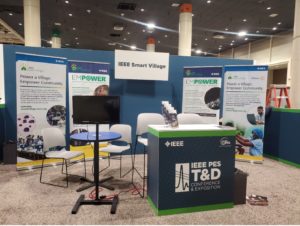
ISV booth at T&D Conference
The colorful display of the ISV booth showcased the various project that organization is involved with, from Latin American to Africa. The display included the electric tractor, sun blazer and the pick man truck.
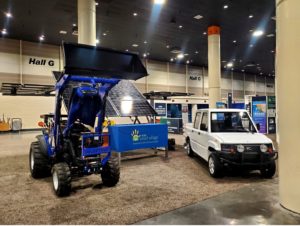
Electric tractor, sun-blazer and pick man truck display at T&D Conference
The pick man truck has been improved with a Lithium batteries, Multi-battery capable. The XR 4×4 has Dual Motor Power, 7.5kW Motor at the rear axle 3kW Motor at the front axle. The XR is all Weather/Terrain Capable with a high wheel base. Furthermore it has a Solar Charging Capable and 3 ton towing & 1 ton payload 70-90 mile range per charge. The top speed (off-road use only) of 50mph.
The tractor is ideal for small or livestock operations, equestrian centers and other utility type work. It runs for about three to six hours with 22 kilo watts per hour pack depending on the load. The Battery can be charged in under eight hours from a 220 Voltage Amperage and Frequency (VAC), 30 amp outlet. Its battery life is 10 years pending operating cycles and depth of discharge 3,500 cycles. ISV V is building a demonstration site to provide charging for Solectrac tractors on the mushroom farm in Pescadero, California.
The different organizations in the Transmission and Distribution industry showcased their latest models in metering, construction, erection, maintenance of overhead lines and distributing in rural areas.
What was interesting is learning the growth of T&D in this sector is taking place in developing countries mostly through the manufacture of large transformers outside the United States, thus increasing competition with parts and equipment suppliers across the globe.
The three day conference had interesting sessions and meetings on various topics ranging from safety to productive use of electricity.
One of the panels discussed how smart cities need to aim at attaining reliable, high – quality power, energy efficient this shows the importance of smart grids. The management of energy in smart cities would be one of the most serious issues due to the complexity of the energy systems and their vital roles. As such, much attention and effort need to be placed and dedicated to effectively solve this problem.
The conference answered some tough questions and fostered new ways of thinking in the electricity industry.
As the electricity world is reaching a major inflection point, it has become more involving than in the past decade to provide safe, reliable, affordable and sustainable electricity.
SNL Demo Abuja, Nigeria
ISV entrepreneurs, Chief Tunde Salihuu with Shaybis Nigeria Ltd (SNL). When the corona virus spread to Ilorin, the state capital of Kwara in Western Nigeria, and a medical center was built to isolate and treat the rapidly increasing number of COVID-19 patients. Like other communities in country, the facility had limited access to electricity. That was until Chief Tunde through SNL donated a Sun Blazer IV solar-powered system for this facility. The system, which was designed by ISV is presently supplying electricity to two wings of the four-wing facility. SNL, based in Ilorin is one of three international manufacturers of the SunBlazer IV system and has been building renewable energy solar systems in Nigeria for over four years.
IEEE SMART VILLAGE: AN ENGINEERING OPPORTUNITY IN NIGERIA WITH CHIEF TUNDE Y. SALIHU
By John P Nelson, Preident and Chief Tunde Y. Salihu
IEEE Smart Village (ISV) integrates sustainable electricity, education, and entrepreneurial solutions to empower communities who have little or no access to electricity. The ISV vision is a world where all people enjoy equal access to electricity and education in order to grow opportunities and leverage change for themselves and others.
The IEEE Power and Energy Society (PES) has been a strong supporter of ISV since its inception with strong support from PES leadership. The late Patrick Ryan, PES Executive Director, strongly endorsed ISV and helped promote the reorganization of ISV as a multi-society/council program. While ISV consists of an ever-increasing number of societies and councils, Patrick advocated the advantages of the program to be administered by PES, which decision was recently reaffirmed by a governing board ad hoc committee headed by past IEEE Treasurer and Director, Joe Lillie.
IEEE Smart Village is a unique program within IEEE that presents an opportunity to all IEEE members in all societies and technical councils. While many aspects of renewable energy production and storage fall under the PES member expertise, the technical scope of ISV projects encompass the missions of practically all IEEE societies and councils. For some societies, the financial support of sustainable and scalable ISV humanitarian projects has been a means for them to participate. For example, the Nuclear and Plasma Sciences Society has been one of the top financial supporters of ISV. The SunBlazer and its controller design team was led by NPSS member Ray Larsen with substantial financial support from NPSS. See photos 1 and 2.
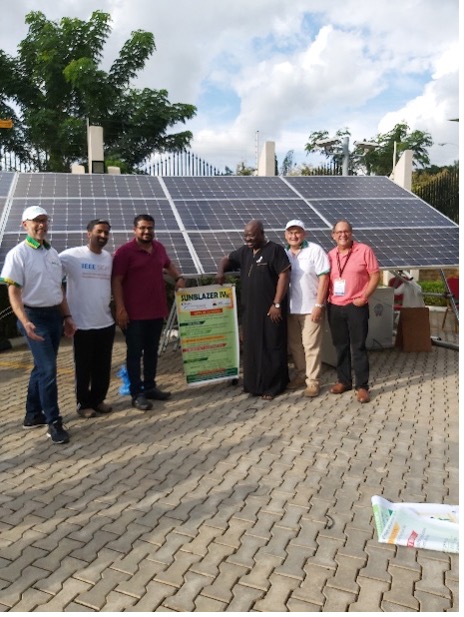
Photo No. 1
SunBlazer IV
SNL Demo Abuja, Nigeria
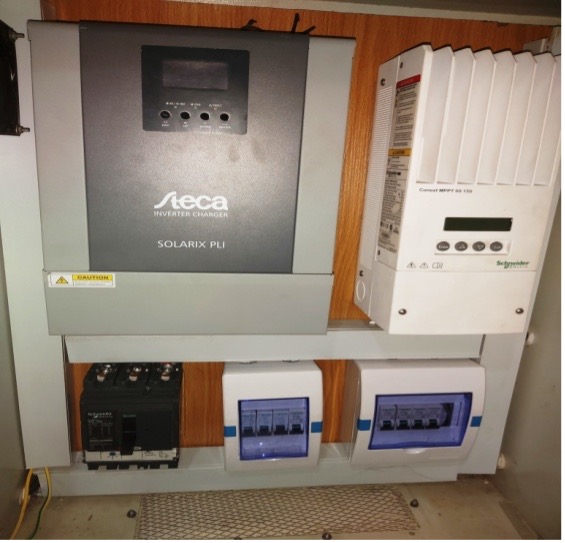
Photo No. 2
Control Unit for SunBlazer
IEEE Smart Village Engineering Opportunities are essentially unlimited for IEEE society and council members. While financial support from each society and council is welcome, it is not a requirement to join IEEE Smart Village. The only requirement is to identify a society or council member as a representative to the governing board. In addition, each society or council would be encouraged to provide its membership an opportunity to participate in ISV. What are some of the opportunities?
- Providing technical support in the three key areas of project design, construction and operations.
- Developing and supporting system controls and metering for the energy systems.
- Providing engineering economic studies and helping to develop business plans.
- Providing technical field support and project inspections.
- Performing project site studies and evaluations.
- Developing and presenting tutorials, webinars and other similar training programs.
- Support regional working groups in the following exiting regions:
a. Africa
b. China
c. Latin America
d. North America
e. South Asia - Taking leadership or member roles on one or more of ISV committees such as:
a. Technical
b. Education
c. Safety, Reliability and Quality
d. Project Development
e. Membership
f. Marketing
g. Finance
h. Business Development
Presently, IEEE Smart Village is working on many exciting projects around the world. ISV has teamed up with Rotary International and Global Telehealth Networks to provide medical support in Uganda and Kenya through a telehealth network where local medical facilities can have access to medical support from medical professionals from around the world.
One of the rewarding aspects of involving telehealth is the impact of how ISV is saving lives. In Africa, many of the young women who become pregnant are HIV positive with no obvious symptoms. The unborn baby with an HIV positive mother is normally not infected prior to birth. However, during birth, the baby has a high probability of contracting HIV for which there is a 75% probability that the young child will die before age 5 due to HIV complications. With proper oral medication given to the mother prior to childbirth and medication to the baby after birth, there is probability above 90% that the baby will not be HIV positive.
Another example is a story regarding one of the ISV entrepreneurs, Chief Tunde Salihuu with Shaybis Nigeria Ltd (SNL). When the corona virus spread to Ilorin, the state capital of Kwara in Western Nigeria, a medical center was built to isolate and treat the rapidly increasing number of COVID-19 patients. Like other communities in country, the facility had limited access to electricity. That was until Chief Tunde through SNL donated a SunBlazer IV solar-powered system for this facility. The system, which was designed by ISV is presently supplying electricity to two wings of the four-wing facility. SNL, based in Ilorin is one of three international manufacturers of the SunBlazer IV system and has been building renewable energy solar systems in Nigeria for over four years.
As a result of this story, I interviewed Chief Tunde Salihu and invited him to share his comments with the readers.
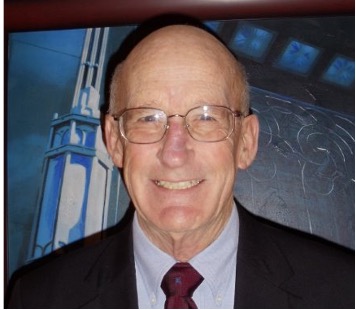
John P Nelson
John: Good afternoon Chief Tunde. You and I met in Abuja at Power Africa 2019 where you were the conference chair. So, you and I know each other quite well. However, I would like to start this interview by allowing the readers to know a little bit about you. Can you provide the readers with a summary of your background including such things as education, IEEE experience, work experience and entrepreneurship? Since the readers may know little or nothing about you, please do not be bashful and provide as much detail on yourself as possible.
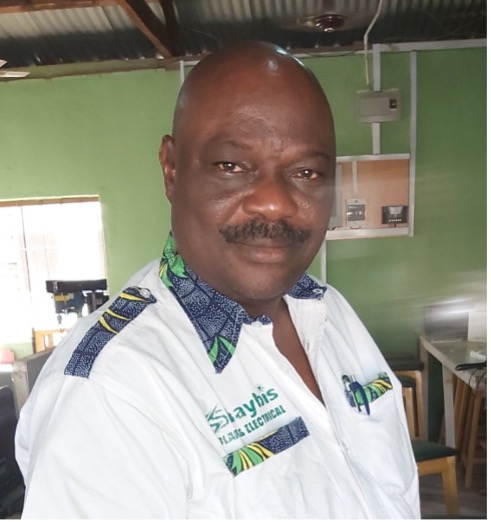
Chief Tunde Sahilu
Chief Tunde: I have had an interesting career of almost 35 years in engineering from maintaining and installing radio phones and PABX (SHELL-, as an intern), designing switch gears, installation and maintenance of office equipment to designing and deployment of ICT technologies from computers to radio/satellite links WAN,LAN and MAN. I am now fully settled with power systems, with a special focus on renewable energy. I will touch on some of my short professional journey.
I had a stint with a number of companies before joining Xerox in 1989 as a service engineer to install and maintain a range of office equipment, where I rose to become a Service Manager for my territory. Prior to joining Xerox I worked with a machine company that gave me opportunities to design and build control panels and feeder pillars. in the 1990s, as NIgeria became more computer competent, I took the plunge by resigning my employment and set up a company called Abitus Computer & Services Ltd which provided products and services in the area of ICT to a number of multinational companies and government agencies. The company was famous for being the first to introduce Internet access to Aba city in 1999. We did microwave, fiber optics and satellite links for ECOBANK to create a WAN. We installed fiber optics links for Nigeria National Petroleum Corporation. We supplied computers to British Council, Abuja and did the Local Area Network for their Port-Harcourt office among many organizations. Along with these endeavors we had a thriving computer training school which provided training to public and corporate organizations such as a Greek company called PZ Industries that gave us a contract to train all their local and foreign staff, as they arrived the Aba factory from 1999 to 2001. We offered servicesto companies such as Nestle’ where we sold computers to the company and helped train their staff to use them, eventually, we expanded our operations to Calabar and Uyo towns.
By 2005 I decided to expand the business to the oil capital city of Nigeria called Port Harcourt and we started offering services to other organizations nationwide. This created an opportunity for me to start my Master’s degree in Electrical Power Systems in 2013, which I finally attained in 2016/17 because the university authorities delayed the program start-up.
Prior to that, I had HND and BSc in Electrical/Electronics Engineering. Professionally, I am a senior member of IEEE, a Fellow of the Nigeria Institute of Power Engineers and a Fellow of the Nigeria Institute Electrical & Electronics Engineers. I am also a Chartered Engineer registered with the Nigerian regulatory body, COREN and a member of Nigeria Society of Engineers.
John: Chief, that is quite an amazing background. I would like to start out by asking you what was your motivation for setting up Shaybis Nigeria Limited (SNL)?
Chief Tunde: As I stated earlier, our company AC&SL was mainly into ICT, but I later obtained a Master’s degree in Power Engineering because I wanted to be part of the solution to many Nigerian’s very poor access to electricity. During my studies I took a very serious review of the Nigerian power system and gained so much knowledge that I appeared on radio programs in Port Harcourt several times. There were weeks when I would appear on four different radio stations and the common question that came from listeners was always: “what is the way out?” my resolve to be part of the solution became stronger, but was not sure about how to start.
My resolve intensified with my experience when my dear mother died in May 2011 and I had to travel to my home town for the burial rites. I got a flight to Lagos but could not get a flight to Ilorin, my home town in Kwara state, so I travelled by road. I was touched by the hundreds of villages and settlements I saw on the road without electricity. It was clear that the youths of these communities lacked many opportunities. At this stage the enormity of the problem became clearer to me and the approach of one community at a time started germinating.
A couple of days after, I travelled down to Abuja, Nigeria’s capital city to hand over to another person as the Chair of IEEE, Nigeria section, a position i held since 2006. I had joined with others to re-start IEEE Nigeria section in 1999, but we had our first meeting in June 2000 in Lagos. Engr. Isaac Adekanye, the convener, became our first Chair officially in 2001 and I became the Chair in 2006. I later served as a member of the N & A (Nominations and Awards???) Committee of IEEE R8 consisting of Europe, the Middle East and Africa from 2011 to 2013. I have been a Trustee of IEEE Nigeria. I later served as Africa Chair, IEEE PES 2016 to 2019. I recently served as Chair, N & A committee for the Africa Council.
While I was studying Electrical Power Systems I became more serious about my PES membership and by 2015 I started getting emails, one of which mentioned a lecture to be delivered about microgrid by Professor Henry Louie, sponsored by ISV. It was at the lecture that I had my first encounter with ISV and I applied for membership and became active in 2016.
Prior to this I had formed SNL to focus on Power projects, especially mini-grid and made plans to move my family to my own state to make an impact. I also ensured that my Master’s project was focused on renewable energy. So, I moved my family to Ilorin, Kwara state in 2015 to fully set up SNL. We started by establishing a shop to sell electrical materials to give the company a foothold. The company then secured a contract in 2017 from the University of Ilorin to design and supervise the mechanical and electrical systems of the Nursing/Midwifery Laboratory project. This was a massive boost to our company as it launched us to bigger opportunities; the project was completed with other partners in 2018.
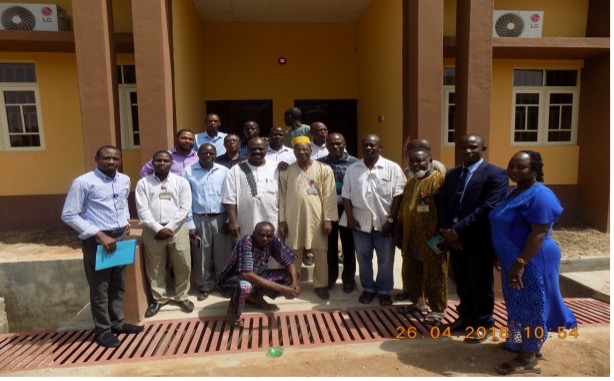
UNILORIN Nursing Laboratory handover
By 2016 we had formed an alliance with the state commercial conglomerate called HARMONY LTD and we were appointed their consultant on renewable energy. It was under this arrangement that we first got support to travel to some parts of Kwara state in collaboration with the Bank of Industry, Nigeria to identify possible off-grid locations. The experience was life changing. In every location we were given to check we discovered many others without electricity. The Ministry of Energy had given us a list of about 760 communities, so, if you extrapolate the above, it means the state has over 3,000 communities without electricity. My resolve to change their situation became cut in stone. I became strategically committed to systematically change the unfortunate narrative.
John: With your formation of SNL, please describe what SNL has and will do including its past, present, and future plans:
Chief Tunde: I moved quickly with ISV and with their support we built our first off-grid facility at Lajolo in December 2017. We built another microgrid for a farm settlement in March 2018 under a special arrangement that meant the owner of the farm would pay over 18 months. Incidentally, the water pumped using the system served about 10 communities around the farm. I consider this project as one of the most impactful, off-grid systems we have ever installed.
Unemployment among (High school? University>) high school and university graduates in Nigeria currently is about 50% and the major cause of this is lack of skills by the graduates and is most worrisome among engineering graduates. I served for 12 years as an examiner for the Nigerian Society of Engineers at Port Harcourt branch until 2018 and was amazed that about 80% of the graduates coming to get registered as Engineers did not have practical skills. Most Electrical Engineering graduates could not even use a soldering iron. So I resolved to set up a vocational center that will serve as a finishing school to give skills to anyone in electrical areas such as CCTV, Electronics, Building wiring and AUTOCAD packages. With ISV support, we were able to establish the school in March 2019. The vocation center has trained about 200 men and women of ages of 10 to 62 years despite disruptions from the COVID 19 pandemic. All our graduates are either working or running their own businesses. We run short time courses of one to 3 months to give participants skills with which they can start earning a living immediately they graduate.
In order to create a solid future for the SNL brand to continue to offer electricity to our people in order to elevate their life from poverty, my Electrical Engineer daughter, Salamat, who is very passionate about community development is our Business Development Manager, while my other daughter, a Chartered Accountant, helps run our finance unit. She also has a passion for honey production and marketing as part of the productive use of electricity.
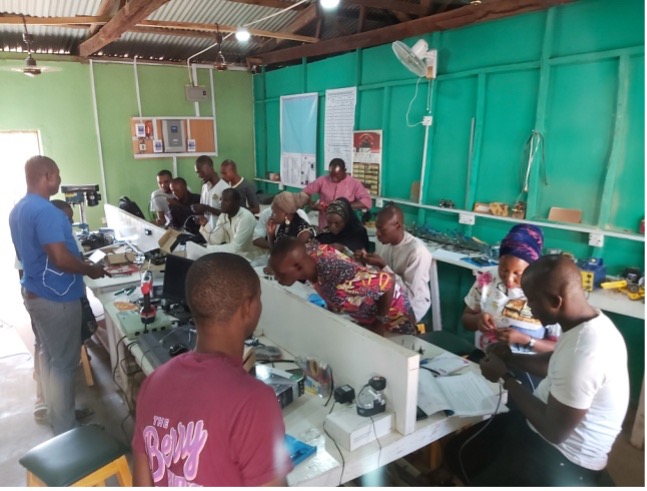
Students in workshop learning skills
John: Africa has roughly 1.2 billion people and roughly 500 million people have little or no access to electricity. What is the situation like in Nigeria?
Chief Tunde: Earlier, I discussed the number of locations in Kwara state without electricity access as estimated at about 3,000. If I limit this to just 1,000 communities per state, Nigeria with 36 states and the federal capital, would have about 37,000 communities without electricity.
The current population estimate for Nigeria is 206 million people and with electricity access of 55%, it means the country has 92.7 million people who are without any access to electricity.
This is worrisome and that is why the government has gotten some funding from multilateral agencies to support developers to go and install off-grid systems in some of the communities.
SNL has registered to participate in the program.
Beyond that, SNL is going fully into the era of productive use of electricity with our new project in Omupo. (which is what?) This project will generate electricity and use it to 1. Power the water pump for the community’s 60,000 liters capacity tank and 2. Power a rice mill that will help the women local rice processors do a better job and with better output get greater benefit. This is one of the strategies we developed to get consumers to use electricity for commercial ventures that will improve their economic conditions and create wealth over time. We learned about productive use of electricity described above from our own training center, where we use solar power to generate electricity and use for our vocational center in a sustainable way.
The Omupo project which we hope to start soon will generate electricity that will be used to pump water for ta community of about 10,000 people. In addition, a rice mill will be set up to help the women to process their rice in a hygienic fashion to be able to make more profits.
John: I understand that SNL has a strong training program. Can you describe what you do in that program?
Chief Tunde: As stated earlier, we run a very solid vocational training school and even University and Polytechnic students come to our center for Industrial Attachment (is this like internships?- Yes) to have practical skills and use our solid facilities for the projects.
We have had at least two University students who have come to use equipment and devices not available in the universities near our center. This is especially important because we have electricity available around the clock at this center which is not at all common throughout Nigeria
John: Having connectivity to the outside world is essential for a good power system and educational program. What have you done with connectivity?
Chief Tunde: On the connectivity front, we have achieved many things; the most important was using IOT meters at our new mini-grid location at Famole. We have full access to all meters and it is helping us to do remote maintenance and access control/monitoring.
We have also used very good internet access at our training center during the 2020/21 COVID 19 pandemic to teach our students remotely as needed.
John: What do you see as the greatest challenge for SNL?
Chief Tunde: Our greatest challenge is the billing system and overcoming people’s poor perception that electricity should be free. We are addressing that by developing multiple billing systems to suit different classes of customers and intensive consumer education. Another major challenge for us is funding as we seek to electrify many communities simultaneously.
John (8): What do you see as the greatest accomplishment to date for SNL and yourself?
Chief Tunde: I will mention three items among many:
- We provided light to a small community for their evening classes and to let their people avoid snakes which had killed a few of them in the past. With a unique billing system, they paid a certain amount monthly and in 18 months the asset became their property.
- We finally solved our billing problem by coming up with a unique solution of monitoring usage and at the same time agreeing on a minimum payment per user. This helped to triple our income.
- The speed with which hitherto unemployed graduates get employed after attending our classes and workshops for one to three months is so gratifying.
John: Providing electricity and education to the community empowers the people to develop businesses. What has been the impact of bringing electricity to the communities you serve and what kind of businesses have been developed?
Chief Tunde: Apart from the many other impacts we have made, the most commercially enduring in my mind is the wife of the Village head of Lajolo. When we got to Lajolo she had abandoned her freezer because the four fuel generators she had used were uneconomical and had broken down irretrievably one after the other. Within a year of our switch on, she moved from her thatched shop to a newly built modern shop built with bricks. She now owns two freezers and her business is thriving. Her shop is the center of attraction to hunters and traders who pass through the village regularly.
More people have also settled in Lajolo and are running their own businesses.
Following the mantra ‘when you do good, you feel good,’ the Kwara state government is in the process of handing over to us the three solar tunnels that control the 2,100-plus street lights in Ilorin, the capital city.
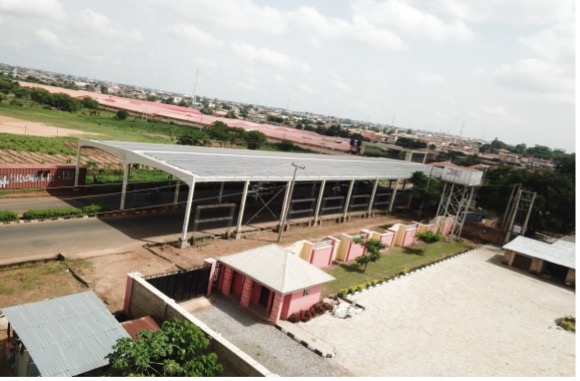
Tunnel controlling street lights
John: SNL have been active in Power Africa Conferences. Please discuss your thoughts about the Power Africa Conferences.
Chief Tunde: PAC is a unique opportunity for African professionals in the area of Power, Energy, and Industrial Practice/Safety, etc, to interact in Africa with their counterparts worldwide in the field. Networking often leads to new solutions for current and future challenges using best practices,
I had the rare opportunity to lead the one held in Abuja in 2019 as the Conference Chair. It was one of the best professional experiences of my life as I learned a lot about organization of international conferences.
I hope ISV can continue to participate in the event as it is one of the places where I sharpened my skills in renewable energy development, design and Installation. Interacting with colleagues and sharing ideas also helps us to improve our management skills in running our mini-grids.
John: You have been a long-standing entrepreneur with IEEE Smart Village. How has IEEE Smart Village impacted SNL?
Chief Tunde: Simply put, ISV has made my dream of giving electricity to my people one community at a time a reality. In fact, during the COVID 19 pandemic, in 2020, our ISV-sponsored SunBlazer was the only source of electricity for the Kwara state government’s second isolation center. The news went viral that time. The SunBlazer was later combined with others to provide electricity to FAMOLE village in 2021.
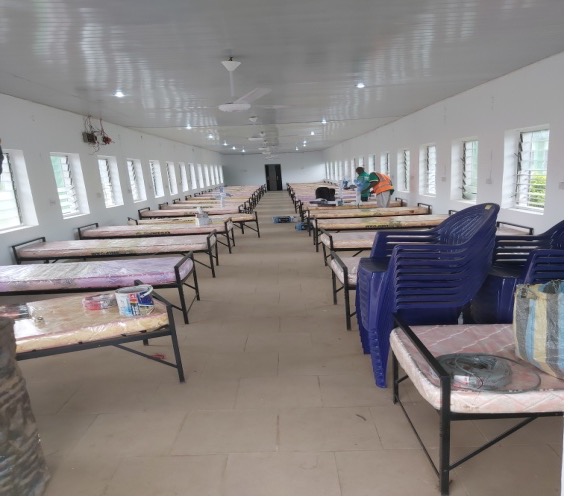
Inside the isolation center powered by SunBlazer
John: We have covered a lot of ground during this interview. Could you please provide some closing remarks including topics we may not have covered?
Chief Tunde: I am personally happy to be associated with ISV for a number of reasons but the most important personal achievement for me is the skills we are helping to build using our company’s facilities. Apart from training people in all our locations, about 90% of our employees were employed without any sellable skills and we have trained them. Some have left us to secure six-figure jobs in a short time. Our company is partnering with our state government and we making people commercially successful in their place of residence. For example, with the last mini-grid we launched at Famole all the commercial customers told us that they are saving $650 per month in fuel alone.
Now that we have developed so many skills, SNL is ready to survey about 1,000 communities within and outsidet Kwara state to make a big dent in the electricity access statistics within the next decade. We are seriously hoping to electrify at least 500 communities in a productive way to create new millionaires in our local communities and to discourage rural to urban migration.
We hope to latch on to the newly developed relationship between ISV and USTDA to secure funding to do feasibility studies on at least 200 communities for immediate electrification. In fact, we have a big village called Dakani surrounded by a group of over six communities that a mini-grid costing just $300,000 will power in a very nice distribution arrangement. This will impact about 5,000 customers upon completion of the project.
CONCLUSION
I hope that you enjoyed this discussion between Chief and me. IEEE Smart Village is very proud of the accomplishments made by Chief Tunde through SNL.
Chief Tunde is helping support Patrick Ryan’s vision to build a strong IEEE Smart Village Program where Pat was heavily involved. Please feel free to help support IEEE Smart Village through a fund developed in the Memory of Patrick Ryan, past executive director of PES and mentor of IEEE Smart Village. Please check out the website and consider a donation.
https://www.ieeefoundation.org/PatrickRyan
– Patrick Ryan
Please share this message with your friends and fellow IEEE members. I encourage each of you to visit the ISV website at smartvillage@ieee.org for more information and to volunteer for IEEE Smart Village.
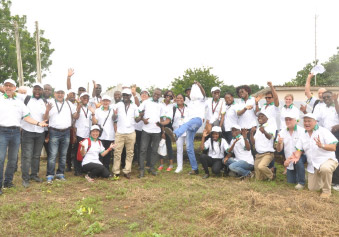
You are invited to join us in Kigali
Power Africa was last held as a virtual conference in Nairobi Kenya as the 9th edition of the conference that joined the list of successful conferences with 26 IEEE Smart Village (ISV) sessions, 9 keynotes addresses, 170 technical papers presentations, and more than 300 participants. However, one thing for sure was missing due to the COVID-19 pandemic which is the in-person networking. An alternative was initiated via a spatial chat platform, this helped but could not match the bonding and networking of an in-person conference. With the effort and hard work of the steering committee, the local organizing committee, volunteers, and the progress made with COVID-19 Vaccines, Power Africa is now back this year as an in-person conference.
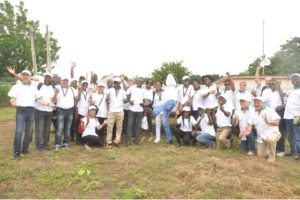
PAC 2019, Abuja, Nigeria
All road leads to Kigali, Rwanda this August from 22nd to 27th for the 10th edition of Power Africa Conference PAC22 hosted by the Kigali Collaborative Research Centre (KCRC) themed Convergence of National and Off-Grid Systems: Roles of Renewables, Productive Use, and Electric Mobility. The 2022 IEEE Power Africa conference is co-hosted at two locations by higher-education centers of excellence in teaching and research: the University of Rwanda and Carnegie Mellon University Africa. More detail at: https://ieee-powerafrica.org/venues/
There will be the traditional technical paper presentations, half-day tutorials on Lightning Protection History and Basics, Emulation of the hydropower plant and industrial photo- voltaic combined with battery energy storage and Fundamentals of Power System Protection Design. Other sessions include the Ph.D. forum, technical tours, Cultural tours, and the smart village sessions with ISV leadership in attendance.
ISV is planning and working towards another great outing at PAC as the Africa working group meets regularly to ensure all that is required to make the conference successful is put in place. The student paper contest is being concluded as well at The Meet the Entrepreneur (MTE) Competition entry submission is still open for submission at: https://ieee-powerafrica.org/meet-the-enterpreneur-competition/
ISV community as always supports her Old friends to attend the conference and this year will not be different. A new talent program is also opened for entrepreneurs that want to be part of ISV community. This provides the opportunity to be supported to join the team in Kigali and pitch their ideas that could impact millions to ISV leadership. Scholarship opportunities to help student authors attend the conference will soon be announced on the website: https://ieee-powerafrica.org/
We hope to meet again in Kigali Rwanda comes August 2022 and you are invited. For more information about the IEEE Power Africa 2022 please do reach out to the general chair or co-chair of the conference via brawn@africa.cmu.edu and niyoyitasamantha@gmail.com respectively.
Article contribution by: Abdullateef Aliyu
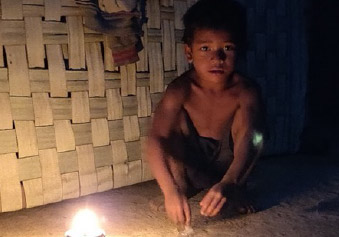
ISV congratulates Sun Moksha for Micro grid Award
IEEE Smart Village would to congratulate Sun Moksha Power Private Limited for receiving the 2022 Micro grid knowledge award at the 2022 winners of the Microgrid Knowledge Greater Good Awards. The project awarded provides for night time studying, streetlights and entertainment in India.
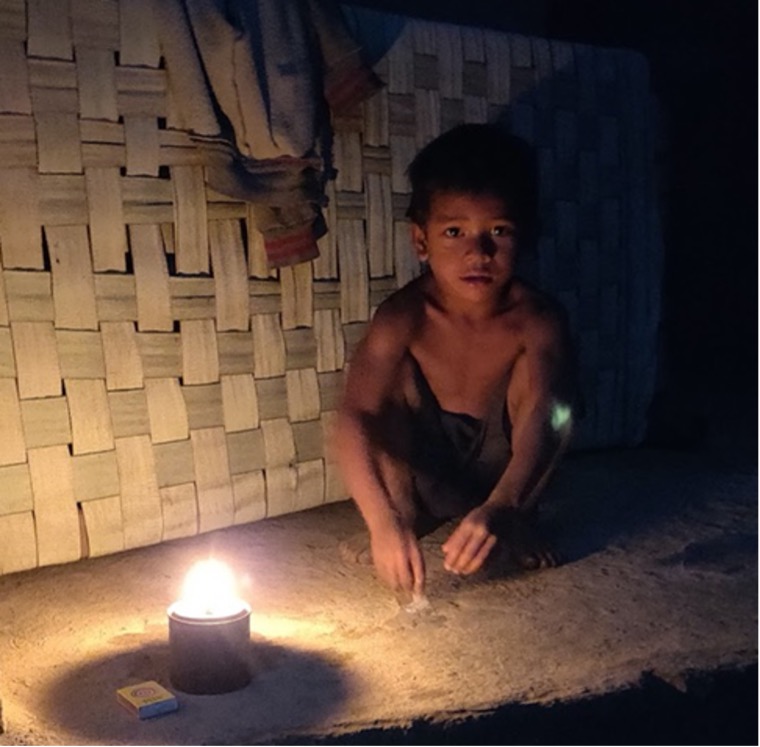
Boy using Sun Moksa Lighting to play
IEEE Smart Village would to congratulate Sun Moksha Power Private Limited for receiving the 2022 Micro grid knowledge award at the 2022 winners of the Microgrid Knowledge Greater Good Awards. The project awarded provides for night time studying, streetlights and entertainment in India.
The awards were announced a conference hosted by Microgrid Knowledge that drew more than 550 microgrid leaders, developers, supporters and users to Philadelphia. Microgrid Knowledge launched the award program four years ago to highlight the humanitarian and societal benefits of microgrids.
The project which was funded by the Good Energies Foundation and C STEP received the highest recognition prize for the project in Kudagaon located on an island in the Mahanadi River, Odisha, India. The island is cut off from the mainland for energy and other infrastructure. The electricity from the microgrid eliminates grid dependency and makes residents more self-sufficient, yielding light for studying, electricity for fans and air conditioning, streetlights for safety, more socializing and evening entertainment,
For the Sun Moksha This award is honorable and brings the organisation to the international forum. “We have received a technology award from India Smart Grid Forum, but this award is special as it emphasizes the ‘humanitarian’ aspect of the project. It is the people who really matter, and how technology impacts the people, that matters. This award gives us a boost to position ourselves internationally and expand our footprint to other countries, including those in North America and Sub-Saharan Africa.” Ashok Das project lead explained.
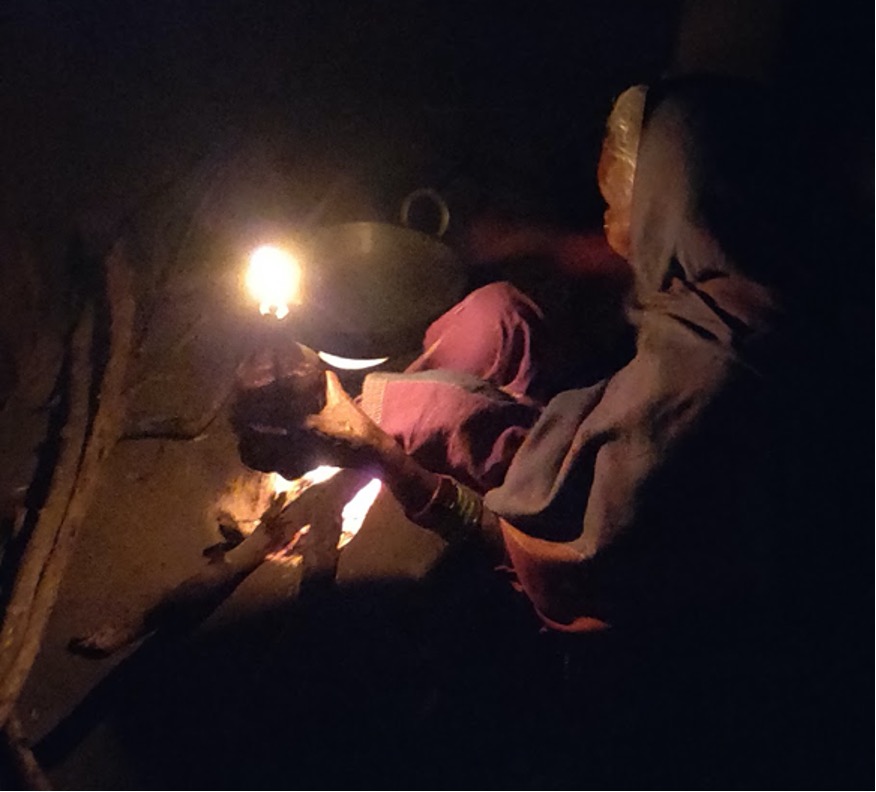
Woman Sun Moksa lighting to cook
The award has generated interest from many communities and will help the organization replicate the success. It is also helping them enhance our technology to serve new markets.
When asked if he had a message for the youth, Ashok had this to say “I think today’s youth are very sensitive to development and really have a lot of hope in them. I would say, follow your heart and you would do wonders. The path of sustainability and rural development is fraught with challenges, but if your heart and mind are there, you will overcome these challenges and succeed in your mission.”
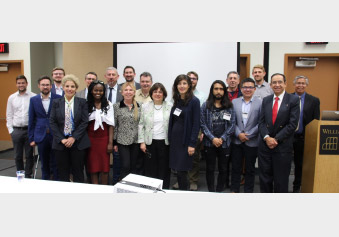
Women Engineers Empowering Off Grid Communities – ISIE
The 31st IEEE International Symposium on Industrial Electronics (ISIE) was held during the period June 1-3, 2022 at the Egan Center in Anchorage, Alaska, USA. The annual conference convened researchers, academics, industry experts and practitioners from over 100 countries both in person and virtually to share their thoughts and experiences on cutting edge technologies, breakthroughs and innovative solutions related to industrial electronics and their applications.
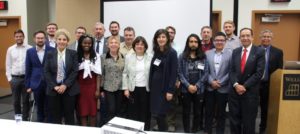
Attendees at ISIE posing for the women in engineering workshop
The conference featured exemplary keynote and plenary speeches alongside the tutorials, special sessions and industry sessions. The aim was to establish an extraordinary environment that promotes innovation and entrepreneurship. The conference focused on the Sustainable Development Goals in all the sessions with the presentations giving highlights on special technologies that have been used to bring a difference in the communities living in rural areas, remote sites and places that face extreme weather conditions. Applications discussed ranged from energy, transportation, health, manufacturing, agriculture and education.
The Industrial Electronics Society, being a key supporter of the IEEE Smart Village initiative, invited one of the entrepreneurs, Mercy Chelangat from Kenya to make a presentation on the joint efforts by both groups to bring electricity, education and enterprise development to underserved communities. Special emphasis was placed on the projects that IES has helped to fund in Africa and Latin America. The title of the session was “Women Engineers Empowering off Grid Communities” and was presented at the Women in Industrial Electronics Workshop.
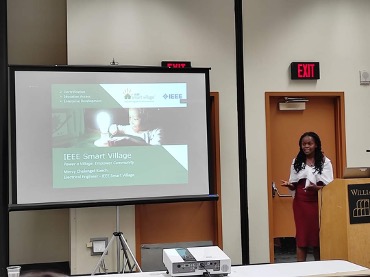
Mercy making ISV presentation at ISIE
Mercy highlighted how the IEEE Smart Village projects are keen on empowering women in their communities of focus. Special thanks to Dr. Morgan Kiani from Texas Christian University who has been fundamental in rallying for IES support of Smart Village projects. The presentation was 20 minutes long and was received with very positive feedback from the audience as well as the IES President, Mariusz Malinowski and the Region 8 Director, Antonio Luque. They pledged to continue to support more projects and onboard other sister societies to join hands and bring more impact to the communities in need.
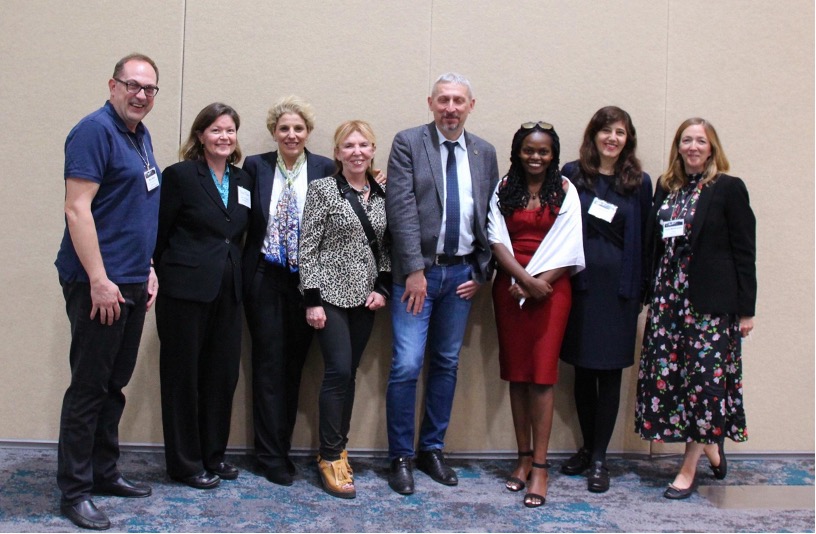
With the IES Leadership team
ISV is truly grateful to the Industrial Electronics Society for their continued support and looks forward to keeping up the collaboration to empower more villages using technology to power productive micro enterprises.
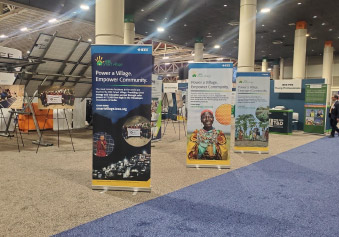
Power in Discovery. Power in Connections
The IEEE Smart Village (ISV) delegation from Africa convened at the Washington DC Dulles International Airport for the last leg of the journey to New Orleans, Louisiana after a long 26 hour flight journey from point of departure. Jude Numfor from Cameroon, Mercy Chelangat, Kenya and Kanekwa Kachinga, Zambia for the first time attended the IEEE Power Energy Society (PES) Transmission and Distribution (T&D) conference which takes place every two years.
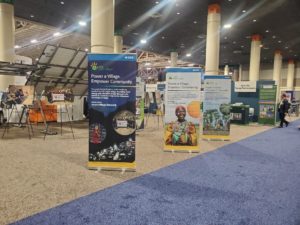
ISV Dinner at T&D 2022
The three had experience that challenged their minds and push their drive to work smarter in improving the lives of their communities through electricity, education and entrepreneurship.
Mercy had the opportunity to present on this PES Women in Power panel about ISV and the role it is playing to future-proof communities in off-grid areas using the three pillar approach of sustainable electrification, education and enterprise development. Few ISV volunteers and partners joined the session Dr. Jack Higgins, Adam Sauer, Michael Deering, Olga Anderson, Alexander Anderson and Henry Ureh. Her presentation was on ISV’s work across the African, Asian and American continents and the impact in rural communities in relation to productive uses of electricity. Mercy referenced how much impact we’re making based on the Sustainable Development Goals and how replicable our initiatives are throughout the globe.
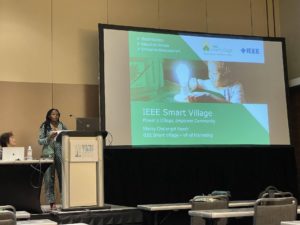
Mercy Chelangat Koech Presenting at T&D
“The whole experience allowed me to think outside the box, the people I interacted with challenged my thoughts, provided insights on my project aimed at empowering women and youth with skills in the gemstone industry. One particular conversation that stuck in my head was a question from one of visitors to the ISV booth on the strategy being used on sustainability of projects. What measures are placed in most of the projects to ensure that even after funding is stopped for a particular project it’s able to sustain itself, he emphasized on how entrepreneurial skills are not enough as projects take time to mushroom.” Kanekwa shared. This question has helped her upon returning home to find avenues that would sustain the project.
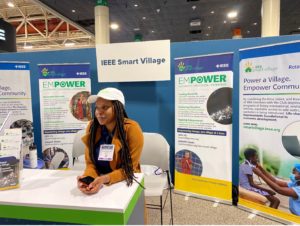
Kanekwa Kachinga at ISV booth T&D 2022
ISV further organized a dinner that provided a great opportunity to interact with amazing people from the governing board, PES society representatives, the IEEE MOVE team, and the past President and IEEE president elect. They were glad to hear from the ISV developers who shared their stories and experiences from the field. We thanked PES on behalf of ISV for their support over the past years.
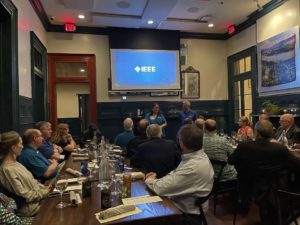
ISV Dinner at T&D 2022
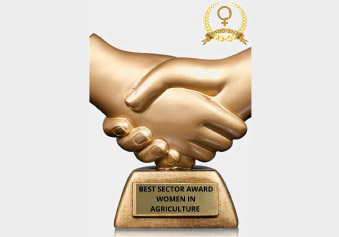
Joan Kerr, Recipient of the IIWD Best Sector Award, Women in Agriculture
The International & Indigenous Women’s Conference held from March 4th to March 8th, 2022, had 8 themed sectors from projects with modern approaches in community services, education, agriculture, business, law, tourism, peace, women’s rights, health & well-being, safety & security and women in investment. Conference presenters – both men and women came from 52 countries, to share their projects, learn from others, find collaborators, and give support to each other.

Words and feelings that come to mind are: inspiring, amazing, and admirable to describe the presenters – both men and women, who were making positive and lasting impacts on their communities and, collectively, the whole world.
My presentation, titled ‘Knowledge to achieve health and economic well-being’ highlighted how the Climate Smart Victory Garden Model is used to link food security, climate change, and entrepreneurship for becoming self-sufficient and resilient.
The Award is significant to me because it was given from the attendee’s comments through the chat, your answers during the question period, survey and final voting. Participants responded to the agricultural knowledge, business acumen and sustainable principles the Climate Smart Victory Garden entails. The power of the model is the applicability to their own projects and communities.
On the last day, the Organizer, Dr, Mariam Khan announced that I would receive the Conference Special Observer because of the input and comments I provided throughout the four days. Needless to say, I was totally surprised, and so thrilled.
It was wonderful to participate in the second annual International & Indigenous Women’s Day Conference, and is definitely an event to remember.
Upcoming Events
Power Africa conference – August 22nd to 27th 2022
Important links you don’t want to miss!
Not an IEEE Member? Here’s how to join IEEE https://www.ieee.org/membership/join/index.html
Click here to learn more about IEEE membership and special discounts for developing nations and low-income economies at https://www.ieee.org/membership/join/emember-countries.html
For more information about discounts for societies, check out the following link: https://www.ieee.org/communities/societies/index.html
For contributions towards many of such projects in memory of Pat Ryan, visit IEEE Smart Village via the following online page : https://www.ieeefoundation.org/PatrickRyan
